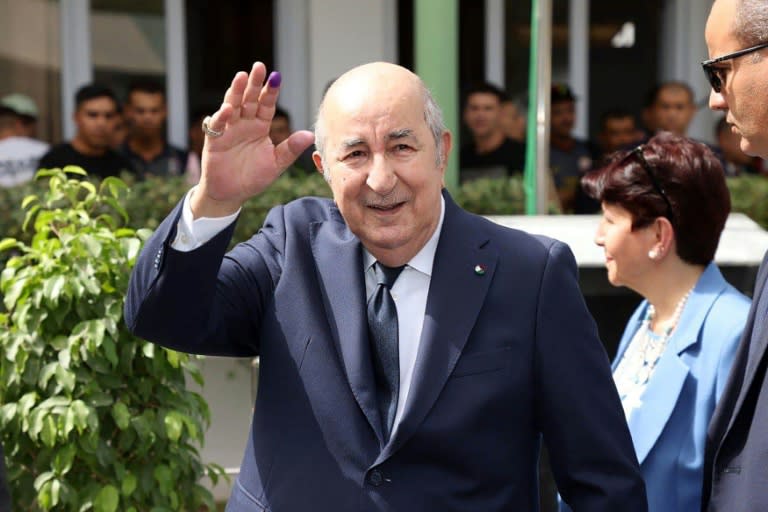Algeria's Tebboune re-elected president for second term

Algeria's incumbent President Abdelmadjid Tebboune has been re-elected with almost 95 percent of the vote, the country's electoral authority ANIE said Sunday.
More than 5.3 million people voted for Tebboune, accounting for "94.65 percent of the vote", ANIE head Mohamed Charfi told reporters.
Tebboune, 78, was heavily favoured to secure a five-year second term in the race against moderate Islamist Abdelaali Hassani, 57, who took 3.17 percent of the vote, and socialist candidate Youcef Aouchiche, 41, who won 2.16 percent.
While Tebboune's re-election was certain, his main focus was boosting voter participation in Saturday's poll after a record abstention rate of over 60 percent in 2019.
That year, Tebboune became president after widely boycotted elections and mass pro-democracy protests from 2019 that died out under his tenure as policing ramped up and hundreds were put in jail.
More than 24 million Algerians were registered to vote, but ANIE didn't say how many people in total had turned out to cast their ballot on Saturday.
French President Emmanuel Macron sent his "warmest congratulations" in a statement late Sunday.
Highlighting the "exceptional relationship" between the nations despite frequent tensions, he added: "Dialogue between our two countries is essential."
-'Masquerade'-
After polling stations closed on Saturday, ANIE announced an "average" turnout rate of 48 percent, calling the figure "provisional".
In an unprecedented move, however, all three campaigns -- including Tebboune's -- issued a joint statement late Sunday alleging "irregularities" in ANIE's results, adding they wanted to make the public aware of "vagueness and contradictions in the participation figures".
Hassani's campaign had earlier said the turnout figure was "strange" and denounced attempts to "inflate the results".
It also said it had recorded "instances of proxy group voting".
In a video posted on Facebook, the campaign's head, Ahmed Sadouk, said the election results were a "masquerade", disputing the turnout announced by ANIE.
He said "the results undermine the elections and tarnish the image of the country".
"The president has been keen to have a significant turnout," Hasni Abidi, an Algeria analyst at the Geneva-based CERMAM Study Center, told AFP. "It's his main issue."
Tebboune's win Sunday was "a victory that looks like a warning", Abidi said, pointing to the incumbent's failure to win over young people, who represent half of Algeria's 45-million-strong population.
As a result, Abidi added, the re-elected president has been "weakened".
All three candidates had courted the youth vote with promises to improve living standards and reduce dependence on hydrocarbons.
After voting in Algiers Saturday morning, Tebboune did not mention turnout, unlike Aouchiche who called for an end to the "boycott" and Hassani who said more voters would make the election "credible".
- 'Divorced' from politics -
"We want this election to result in a real change... a change for the better," said voter Hassane Boudaoud, 52.
Two women, Taous Zaiedi, 66, and Leila Belgaremi, 42, said they were voting to "improve the country".
Ibrahim Sendjak Eddine, a day labourer, said Algerians "are looking for stability, job opportunities, work and housing".
Tebboune had touted economic successes during his first term, including more jobs and higher wages in Africa's largest exporter of natural gas.
Although Algeria's economy has grown at an annual rate of about four percent over the past two years, it remains heavily dependent on oil and gas to fund its social programmes.
Tebboune had also pledged to create 450,000 jobs if re-elected.
The president should now address the major deficit in political and media freedoms, with Algerians having "divorced current politics" after the so-called Hirak protests ended, analyst Abidi said.
Amnesty International said earlier this week Algerian authorities were continuing to "stifle civic space by maintaining a severe repression of human rights".
Five years after the Hirak protest movement, Algeria has seen "new arbitrary arrests", while authorities maintain "a zero tolerance approach to dissenting opinions", it said.
Dozens remain behind bars or are still being prosecuted due to their activism, according to prisoners' rights group CNLD.
bur-jj/smw/fox
